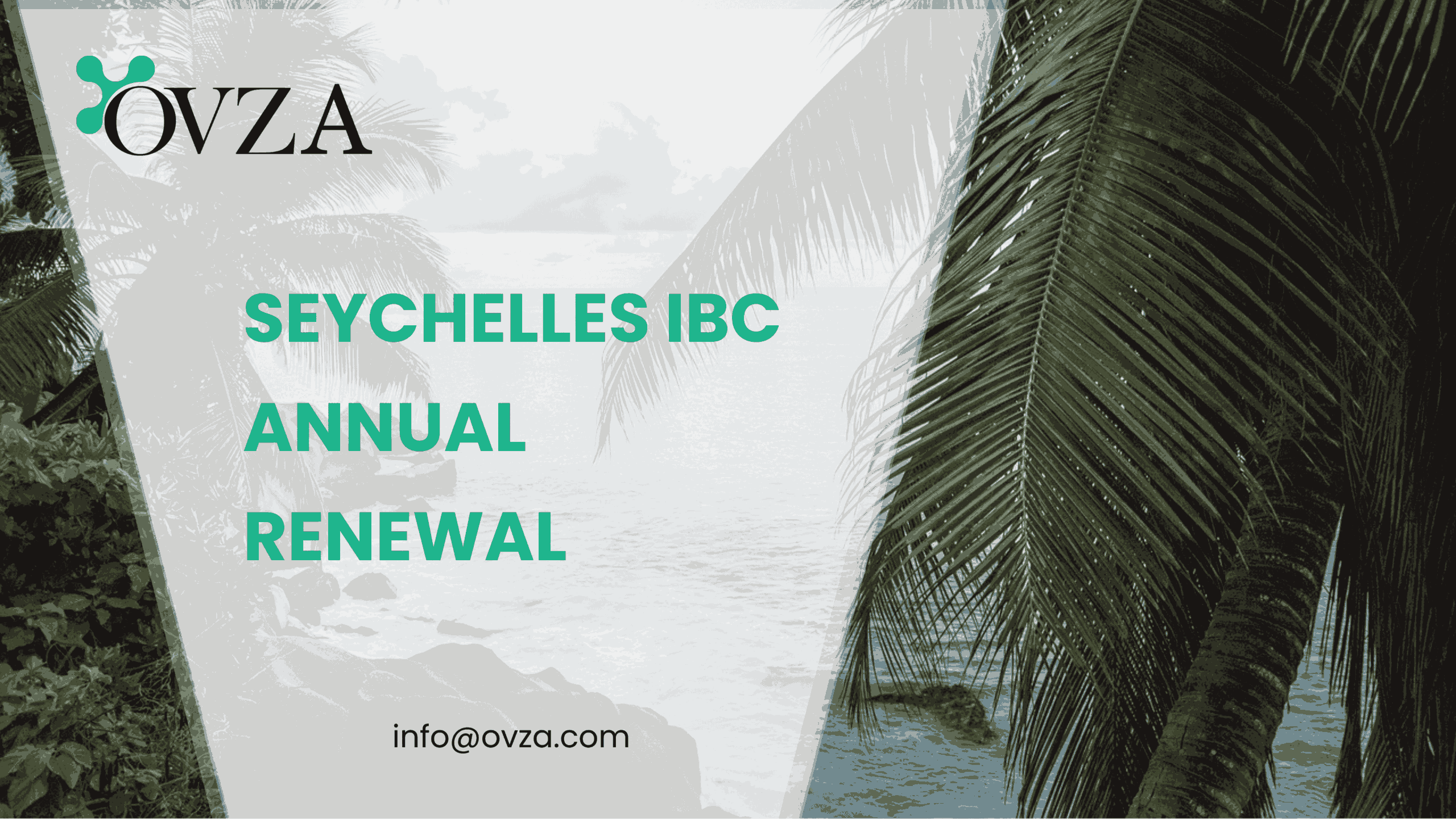Seychelles IBC annual renewal – Seychelles IBCs must complete annual renewal to avoid penalties, loss of legal status, and FSA regulatory action under the IBC Act and AML laws. The annual renewal of a Seychelles International Business Company (IBC) constitutes a core statutory obligation under the governing legal framework established by the International Business Companies Act, 2016, as amended. This process is not merely administrative but directly linked to the maintenance of the legal personality and good standing of the IBC in the jurisdiction. Failure to observe renewal formalities within prescribed deadlines can result in penalties, administrative sanctions, and ultimately, the striking off of the entity from the register maintained by the Seychelles Financial Services Authority (FSA).
Statutory Requirements and Legal Implications
The annual renewal of a Seychelles International Business Company (IBC) constitutes a core statutory obligation under the governing legal framework established by the International Business Companies Act, 2016, as amended. This process is not merely administrative but directly linked to the maintenance of the legal personality and good standing of the IBC in the jurisdiction. Failure to observe renewal formalities within prescribed deadlines can result in penalties, administrative sanctions, and ultimately, the striking off of the entity from the register maintained by the Seychelles Financial Services Authority (FSA).
Under the Act, every IBC is required to pay an annual government fee, which is due on the anniversary of its incorporation. This statutory renewal fee is not discretionary and must be remitted through a licensed registered agent, who is also responsible for ensuring the company remains compliant with recordkeeping and filing obligations. The fee structure varies depending on the company’s authorized share capital but is generally modest, designed to preserve Seychelles’ competitive position as a cost-effective offshore jurisdiction. However, the legal consequences of non-payment are significant, as failure to pay within the prescribed time frame results in automatic penalties and, if not rectified, dissolution of the company by the Registrar.
The annual renewal of a Seychelles IBC also serves as a compliance checkpoint in respect of other regulatory obligations. Registered agents are required under the Anti-Money Laundering and Countering the Financing of Terrorism Act (AML/CFT) to maintain up-to-date beneficial ownership information, conduct due diligence reviews, and confirm that the IBC has not engaged in restricted activities. Accordingly, the renewal process may involve requests for updated KYC documents, declarations of business activity, and confirmation of tax residency status where applicable. These requirements, though not formally part of the IBC Act, are interlinked through the regulatory oversight applied to registered agents.
The annual renewal process must also be considered in the context of international compliance pressures. As part of its commitments under the OECD’s Global Forum on Transparency and Exchange of Information for Tax Purposes, Seychelles has adopted international standards concerning the timely availability and exchange of beneficial ownership and accounting records. Renewal procedures often trigger reviews to ensure that such records are available and that the IBC is not being used to facilitate tax evasion or other illicit activity. This has prompted stricter enforcement practices by the FSA and a growing trend toward proactive compliance audits.
In practice, a Seychelles IBC that fails to renew on time may be struck off the register, leading to loss of legal capacity, freezing of assets, and restrictions on legal action. Struck-off companies may be restored under section 276 of the Act within seven years, subject to payment of all outstanding fees and penalties, but during the interim, their legal personality is suspended. This carries substantial risk for contractual parties, banking arrangements, and intellectual property holdings registered in the name of the IBC.
Impacts on Legal Status and Enforcement Risks
The failure to comply with annual renewal obligations under Seychelles law triggers a series of cascading legal consequences that may severely impair the legal efficacy and enforceability of the IBC’s actions. Once an IBC is struck off the register due to non-renewal, it loses its status as a legal person. Although section 275(2) of the International Business Companies Act permits a struck-off company to remain liable for its obligations and capable of being sued, it cannot initiate legal proceedings or engage in contractual relations during the period of inactivity. This partial survival of liability without legal capacity creates a paradox that affects creditors, counterparties, and beneficial owners alike.
Renewal non-compliance also poses challenges for corporate governance and the exercise of fiduciary duties. Directors who continue to act on behalf of a struck-off company may incur personal liability, especially where their actions are deemed to mislead third parties or contravene fiduciary duties under the common law or section 152 of the Act. Registered agents, too, must cease service provisions to such companies and report any suspicious transactions to the relevant authorities in accordance with AML/CFT legislation. Continued operation of a lapsed IBC may also raise red flags with correspondent banks, leading to account freezes or terminations under enhanced due diligence protocols.
From a private international law perspective, the recognition of a struck-off IBC in other jurisdictions becomes legally uncertain. Common law courts may refuse to recognize legal acts undertaken during the period of deregistration, particularly where the striking-off constitutes a formal loss of capacity. Courts in jurisdictions applying strict conflict-of-laws rules may invalidate contracts or refuse to recognize property transfers made by or to the IBC. This can have significant implications for trusts, holding structures, and asset protection vehicles in which the IBC serves as a trustee or shareholder. Renewal lapses can therefore undermine the entire integrity of offshore planning structures and trigger cross-border litigation.
The Seychelles regime provides for company restoration by application to the Registrar or the Supreme Court, depending on the reason for striking-off. Restoration under section 276 is administrative and applies where the sole reason for dissolution was non-payment of fees. However, restoration by court order under section 277 is required where striking-off resulted from regulatory breaches, such as non-compliance with anti-money laundering rules. In both cases, restoration is retroactive to the date of striking-off, but practical barriers remain. Restoration may take weeks to process, require court filings, and be subject to discretionary refusal where public policy or tax evasion concerns are present.
These risks underscore the importance of timely compliance with annual renewal requirements. Given the role of Seychelles IBCs in international asset holding and cross-border investment, failure to maintain legal continuity can disrupt complex legal arrangements. Annual renewal should not be viewed as a mere formality but as a legal safeguard that preserves the company’s capacity to act, sue, hold title, and shield ownership within global commercial structures.
Regulatory Synchronization and Registered Agent Duties
The enforcement of annual renewal obligations is further reinforced through the regulatory framework that governs licensed service providers. Registered agents in Seychelles are required under the FSA Code of Practice to monitor compliance timelines and notify IBCs of impending renewal deadlines. They are also required to cease services to any company that fails to comply, including suspension of registered office services, nominee functions, and filing of company documents. Failure of the registered agent to perform these duties can result in administrative penalties or suspension of their license under the Financial Services Authority Act.
The increasing international focus on tax transparency, beneficial ownership disclosure, and anti-money laundering compliance means that annual renewal has become a gateway through which the Seychelles Financial Services Authority ensures that IBCs are operating within permissible boundaries. Renewal thus functions as both a legal and regulatory checkpoint, allowing authorities to detect dormant companies, screen suspicious activity, and update registries consistent with OECD and Financial Action Task Force (FATF) standards.
In this regard, jurisdictions that maintain low renewal costs but demand high compliance output are under pressure to balance regulatory integrity with commercial attractiveness. Seychelles, in particular, has sought to maintain this balance by streamlining administrative renewals while concurrently imposing rigorous compliance reviews via the registered agent regime. These measures are designed to ensure that Seychelles IBCs remain viable within the evolving legal architecture of international finance, without becoming vulnerable conduits for unlawful activities.
Conclusion
Annual renewal of a Seychelles IBC is a legal obligation with far-reaching implications for the company’s legal capacity, commercial credibility, and compliance status. Timely payment of the renewal fee and fulfillment of related due diligence obligations are essential to preserving the company’s standing and avoiding deregistration, penalties, and regulatory scrutiny. Restoration mechanisms exist, but they entail delay, procedural burden, and legal uncertainty, particularly for cross-border transactions. The annual renewal process is therefore integral to the continued validity of the IBC’s legal personality, and to the enforceability of its contracts, governance actions, and asset holdings in Seychelles and abroad.
Disclaimer: The information provided on this website is intended for general reference and educational purposes only. While OVZA makes every effort to ensure accuracy and timeliness, the content should not be considered legal, financial, or tax advice.











